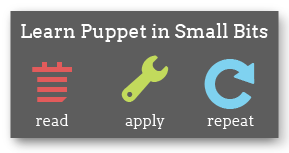A newer version of Puppet Enterprise has been released!
Navigation
- Introduction
- Overview
- Installing
- Upgrading
- Using Puppet Enterprise
- The Accounts Module
- The
accounts::userType - The
accountsClass
- The
- Puppet Compliance
- Known Issues
- Troubleshooting
- Answer File Reference
The accounts Class
The accounts class can do any or all of the following:
- Create and manage a set of
accounts::userresources - Create and manage a set of shared
groupresources - Maintain a pair of rules in the
sudoersfile granting privileges to thesudoandsudonopwgroups
This class is designed for cases where your account data is maintained separately from your Puppet manifests. This usually means it is being read on demand from a non-Puppet directory service or CMDB, managed manually by a user who does not write Puppet code, or generated by an out-of-band process. If your site’s account data will be maintained manually by a sysadmin able to write Puppet code, it will make more sense to maintain it as a normal set of accounts::user and group resources, although you may still wish to use the accounts class to maintain sudoers rules.
To manage users and groups with the accounts class, you must prepare a data store and configure the class for the data store when you declare it.
Usage Example
To use YAML files as a data store:
class {'accounts':
data_store => yaml,
}
To use a Puppet class as a data store and manage sudoers rules:
class {'accounts':
data_store => namespace,
data_namespace => 'site::accounts::data',
manage_sudoers => true,
}
To manage sudoers rules without managing any users or groups:
class {'accounts':
manage_users => false,
manage_groups => false,
manage_sudoers => true,
}
Data Stores
Account data can come from one of two sources: a Puppet class that declares three variables, or a set of three YAML files stored in /etc/puppetlabs/puppet/data.
Using a Puppet Class as a Data Store
This option is most useful if you are able to generate or import your user data with a custom function, which may be querying from an LDAP directory or some other arbitrary data source.
The Puppet class containing the data must have a name ending in ::data. (We recommend site::accounts::data.) This class must declare the following variables:
$users_hashshould be a hash in which each key is the title of anaccounts::userresource and each value is a hash containing that resource’s attributes and values.$groups_hashshould be a hash in which each key is the title of a group and each value is a hash containing that resource’s attributes and values.$users_hash_defaultis an inert variable resulting from a known issue, and should be an empty hash ({}). Note that part of this variable’s name is the reverse of the corresponding file name.
See below for examples of the data formats used in these variables.
When declaring the accounts class to use data in a Puppet class, use the following attributes:
data_store => namespace,
data_namespace => {name of class},
Using YAML Files as a Data Store
This option is most useful if your user data is being generated by an out-of-band process or is being maintained by a user who does not write Puppet manifests.
When storing data in YAML, the following valid YAML files must exist in /etc/puppetlabs/puppet/data:
accounts_users_hash.yaml, which should contain an anonymous hash in which each key is the title of anaccounts::userresource and each value is a hash containing that resource’s attributes and values.accounts_groups_hash.yaml, which should contain an anonymous hash in which each key is the title of a group and each value is a hash containing that resource’s attributes and values.accounts_users_default_hash.yaml, which is an inert file resulting from a known issue and should contain an anonymous hash with at least one dummy key/value pair. Note that part of this file’s name is the reverse of the corresponding Puppet variable name.
See below for examples of the data formats used in these variables.
When declaring the accounts class to use data in YAML files, use the following attribute:
data_store => yaml,
Data Formats
This class uses three hashes of data to construct the accounts::user and group resources it manages.
The Users Hash
The users hash represents a set of accounts::user resources. Each key should be the title of an accounts::user resource, and each value should be another hash containing that resource’s attributes and values.
Puppet Example
$users_hash = {
sysop => {
locked => false,
comment => 'System Operator',
uid => '700',
gid => '700',
groups => ['admin', 'sudonopw'],
sshkeys => ['ssh-rsa AAAAB3NzaC1yc2EAAAABIwAAAQEAwLBhQefRiXHSbVNZYKu2o8VWJjZJ/B4LqICXuxhiiNSCmL8j+5zE/VLPIMeDqNQt8LjKJVOQGZtNutW4OhsLKxdgjzlYnfTsQHp8+JMAOFE3BD1spVnGdmJ33JdMsQ/fjrVMacaHyHK0jW4pHDeUU3kRgaGHtX4TnC0A175BNTH9yJliDvddRzdKR4WtokNzqJU3VPtHaGmJfXEYSfun/wFfc46+hP6u0WcSS7jZ2WElBZ7gNO4u2Z+eJjFWS9rjQ/gNE8HHlvmN0IUuvdpKdBlJjzSiKZR+r/Bo9ujQmGY4cmvlvgmcdajM/X1TqP6p3OuouAk5QSPUlDRV91oEHw== [email protected]'],
},
villain => {
locked => true,
comment => 'Test Locked Account',
uid => '701',
gid => '701',
groups => ['admin', 'sudonopw'],
sshkeys => ['ssh-rsa AAAAB3NzaC1yc2EAAAABIwAAAQEAwLBhQefRiXHSbVNZYKu2o8VWJjZJ/B4LqICXuxhiiNSCmL8j+5zE/VLPIMeDqNQt8LjKJVOQGZtNutW4OhsLKxdgjzlYnfTsQHp8+JMAOFE3BD1spVnGdmJ33JdMsQ/fjrVMacaHyHK0jW4pHDeUU3kRgaGHtX4TnC0A175BNTH9yJliDvddRzdKR4WtokNzqJU3VPtHaGmJfXEYSfun/wFfc46+hP6u0WcSS7jZ2WElBZ7gNO4u2Z+eJjFWS9rjQ/gNE8HHlvmN0IUuvdpKdBlJjzSiKZR+r/Bo9ujQmGY4cmvlvgmcdajM/X1TqP6p3OuouAk5QSPUlDRV91oEHw== [email protected]'],
},
}
YAML Example
---
sysop:
locked: false
comment: System Operator
uid: '700'
gid: '700'
groups:
- admin
- sudonopw
sshkeys:
- ssh-rsa AAAAB3NzaC1yc2EAAAABIwAAAQEAwLBhQefRiXHSbVNZYKu2o8VWJjZJ/B4LqICXuxhiiNSCmL8j+5zE/VLPIMeDqNQt8LjKJVOQGZtNutW4OhsLKxdgjzlYnfTsQHp8+JMAOFE3BD1spVnGdmJ33JdMsQ/fjrVMacaHyHK0jW4pHDeUU3kRgaGHtX4TnC0A175BNTH9yJliDvddRzdKR4WtokNzqJU3VPtHaGmJfXEYSfun/wFfc46+hP6u0WcSS7jZ2WElBZ7gNO4u2Z+eJjFWS9rjQ/gNE8HHlvmN0IUuvdpKdBlJjzSiKZR+r/Bo9ujQmGY4cmvlvgmcdajM/X1TqP6p3OuouAk5QSPUlDRV91oEHw== [email protected]
villain:
locked: true
comment: Test Locked Account
uid: '701'
gid: '701'
groups:
- admin
- sudonopw
sshkeys:
- ssh-rsa AAAAB3NzaC1yc2EAAAABIwAAAQEAwLBhQefRiXHSbVNZYKu2o8VWJjZJ/B4LqICXuxhiiNSCmL8j+5zE/VLPIMeDqNQt8LjKJVOQGZtNutW4OhsLKxdgjzlYnfTsQHp8+JMAOFE3BD1spVnGdmJ33JdMsQ/fjrVMacaHyHK0jW4pHDeUU3kRgaGHtX4TnC0A175BNTH9yJliDvddRzdKR4WtokNzqJU3VPtHaGmJfXEYSfun/wFfc46+hP6u0WcSS7jZ2WElBZ7gNO4u2Z+eJjFWS9rjQ/gNE8HHlvmN0IUuvdpKdBlJjzSiKZR+r/Bo9ujQmGY4cmvlvgmcdajM/X1TqP6p3OuouAk5QSPUlDRV91oEHw== [email protected]
The Groups Hash
The groups hash represents a set of shared group resources. Each key should be the title of a group resource, and each value should be another hash containing that resource’s attributes and values.
Puppet Example
$groups_hash = {
developer => {
gid => 3003,
ensure => present,
},
sudonopw => {
gid => 3002,
ensure => present,
},
sudo => {
gid => 3001,
ensure => present,
},
admin => {
gid => 3000,
ensure => present,
},
}
YAML Example
---
developer:
gid: "3003"
ensure: "present"
sudonopw:
gid: "3002"
ensure: "present"
sudo:
gid: "3001"
ensure: "present"
admin:
gid: "3000"
ensure: "present"
The User Defaults Hash
The user defaults hash has no effect on the behavior of the accounts module, but is required due to a known issue. It should be either an empty hash or a hash with one or more dummy key/value pairs. (The function that loads YAML from disk is unable to recognize an empty hash, as an empty YAML hash is indistinguishable from an empty YAML string.)
Puppet Example
$users_hash_default = {}
YAML Example
---
key: "value"
Parameters
manage_groups
Whether to manage a set of shared groups, which can be used by all accounts::user resources. If true, your data store must define these groups in the $groups_hash variable or the accounts_groups_hash.yaml file. Allowed values are true and false; defaults to true.
manage_users
Whether to manage a set of accounts::user resources. If true, your data store must define these users in the $users_hash variable or the accounts_users_hash.yaml file. Default attributes that apply to all users should be defined in the $users_hash_default variable or the accounts_users_default_hash.yaml file. Allowed values are true and false; defaults to true.
manage_sudoers
Whether to add sudo rules to the node’s sudoers file. If true, the class will add %sudo and %sudonopw groups to the sudoers file and give them full sudo and passwordless sudo privileges respectively. You will need to make sure that the sudo and sudonopw groups exist in the groups hash, and that your chosen users have those groups in their groups arrays. Managing sudoers is not supported on Solaris.
Allowed values are true and false; defaults to false.
data_store
Which data store to use for accounts and groups.
When set to namespace, data will be read from the puppet class specified in the data_namespace parameter. When set to yaml, data will be read from specially-named YAML files in the /etc/puppetlabs/puppet/data directory. (If you have changed your $confdir, it will look in $confdir/data.) Example YAML files are provided in the ext/data/ directory of this module.
Allowed values are yaml and namespace; defaults to namespace.
data_namespace
The Puppet namespace from which to read data. This must be the name of a Puppet class, and must end with ::data (we recommend using site::accounts::data), which will automatically be declared by the accounts class. The class must be a non-parameterized class that declares variables named:
$users_hash$groups_hash$users_hash_default
See the accounts::data class included in this module (in manifests/data.pp) for an example; see below for information on each hash’s data structure.
Defaults to accounts::data.
sudoers_path
The path to the sudoers file on this system. Defaults to /etc/sudoers.

